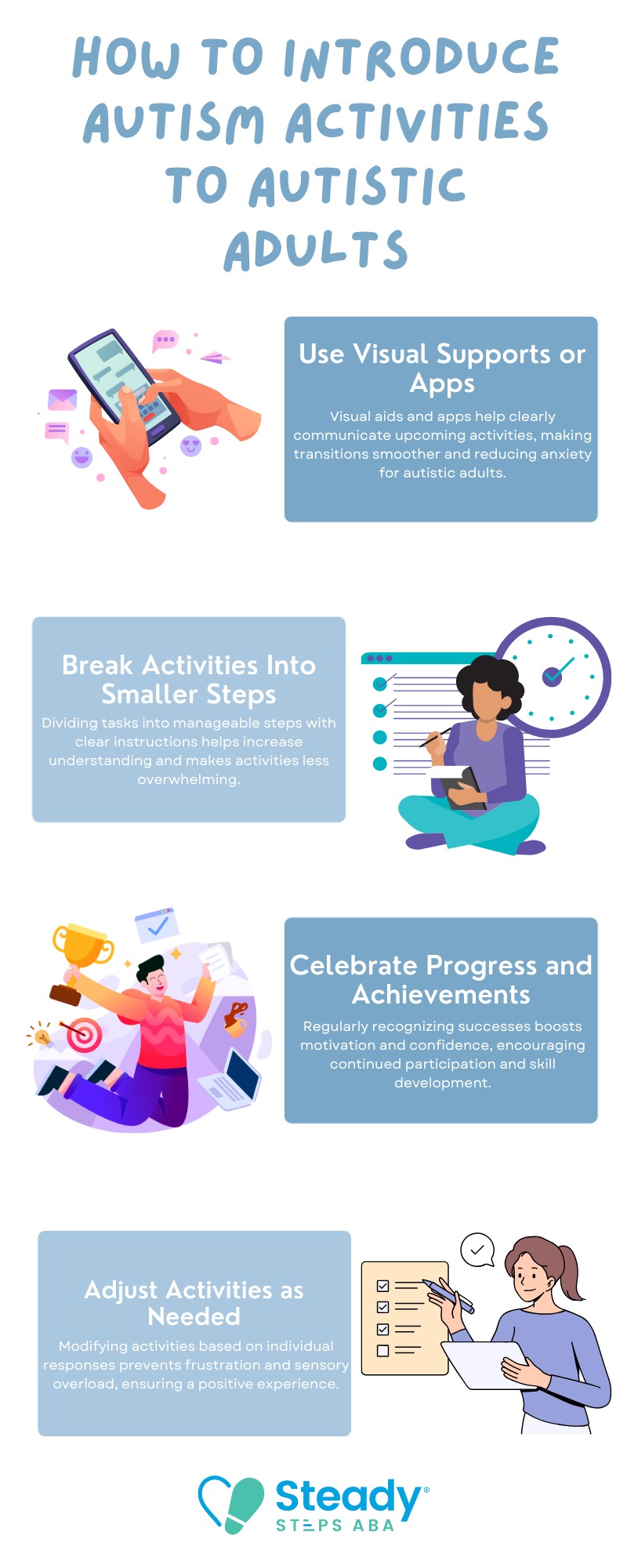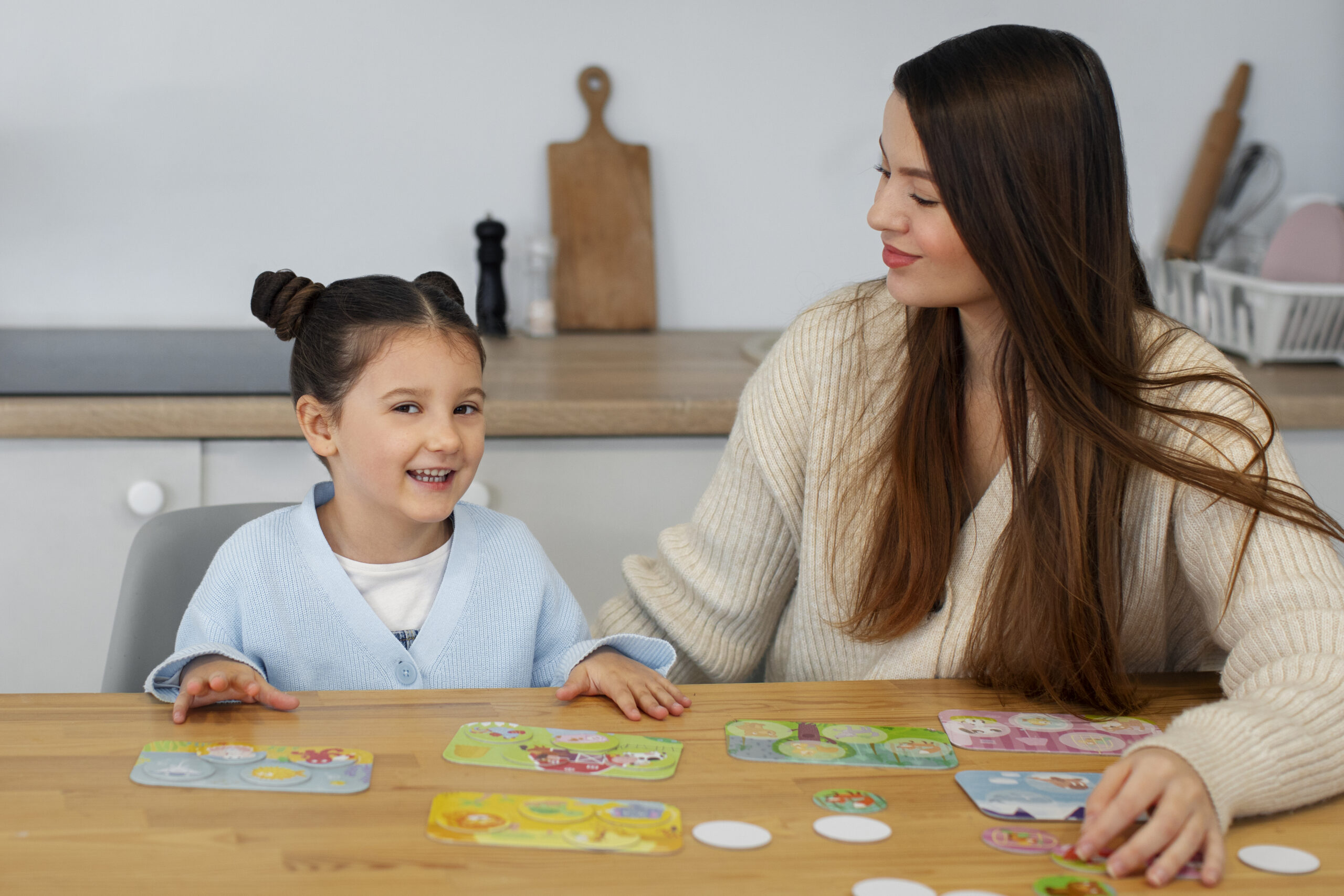Key Points:
- Autism activities for adults can enhance social skills, independence, and overall well-being by addressing sensory, cognitive, and emotional needs.
- Activities range from physical exercise and creative arts to vocational skills and social groups, all tailored to individual preferences and strengths.
- Consistent support and structure in these activities improve engagement and promote skill-building.
Engaging autistic adults in meaningful activities can significantly enhance quality of life, promote skill-building, and encourage social connection. These activities are often tailored to accommodate sensory sensitivities, unique communication styles, and individual interests, making them both therapeutic and enjoyable.
Approximately 1 in 45 adults in the U.S. are diagnosed with autism spectrum disorder, highlighting the importance of offering supportive and engaging opportunities. Such activities can help address common challenges in adulthood, including social isolation, anxiety, and limited access to vocational or recreational experiences.
What are the Best Autism Activities for Adults?
The best autism activities for adults focus on enhancing communication, social interaction, sensory regulation, and independence while being adapted to individual preferences and abilities. These activities provide safe, supportive environments that encourage growth, engagement, and self-expression.
Adults on the spectrum often thrive when activities are predictable, flexible, and allow them to pursue their interests. The goal is to balance stimulation and calmness, improving life skills and personal satisfaction.

How Can Physical Activities Benefit Adults with Autism?
Physical exercise plays a critical role in overall health and well-being. For adults with autism, physical activities offer sensory regulation, reduce anxiety, and improve mood and motor skills.
Choosing the right physical activities depends on sensory preferences and motor abilities. Some may prefer low-impact, rhythmic exercises, while others enjoy more vigorous movement. Physical activity can also provide social opportunities in structured group settings, encouraging interaction and teamwork.
Effective physical activities for adults with autism include:
1. Walking or Hiking
Gentle and low-impact, walking or hiking supports cardiovascular health while providing a calming, structured sensory experience. Nature trails also offer visual and auditory stimulation in a peaceful setting.
2. Swimming
Swimming combines full-body movement with consistent water pressure, which many individuals with autism find soothing. It’s also low-impact, making it ideal for improving strength and endurance without joint strain.
3. Yoga and Stretching
Yoga enhances flexibility, balance, and body awareness while promoting relaxation through deep breathing and mindfulness. It’s especially helpful for reducing anxiety and increasing emotional regulation.
4. Team Sports or Adapted Fitness Classes
Structured group activities like basketball, bowling, or specially designed fitness programs offer a social outlet in a supportive environment. These can help develop teamwork, turn-taking, and cooperative skills.
5. Dancing
Dance incorporates rhythm, coordination, and creative expression. It allows individuals to explore movement in a fun and freeing way while boosting mood and sensory integration.
Each of these activities can be adapted to individual needs, ensuring positive experiences and consistent participation.
What Creative Activities Support Skill Development and Expression?
Creative activities provide a powerful outlet for self-expression and cognitive engagement. Adults with autism may have strong interests in specific arts, crafts, or music, which can also help develop fine motor skills and focus.
Creative pursuits offer flexible environments where adults can explore sensory experiences and reduce stress through enjoyable tasks. They also promote independence by teaching new skills and encouraging problem-solving.
Popular creative autism activities for adults include:
1. Painting and Drawing
These visual arts allow individuals to express thoughts, feelings, and ideas without needing words. They also help refine fine motor skills and offer a calming, sensory-friendly outlet.
2. Crafting (e.g., Knitting, Woodworking)
Craft projects provide clear start-to-finish goals, helping build concentration, patience, and problem-solving skills. They can also be soothing and tactile, making them ideal for sensory regulation.
3. Playing Musical Instruments or Listening to Music
Music taps into auditory processing and emotional expression. Playing instruments enhances coordination, while listening to or creating music can regulate mood and provide a deep sense of connection.
4. Writing or Journaling
Whether through stories, poetry, or daily reflections, writing supports language development and self-expression. Journaling can also help individuals process experiences and emotions privately and safely.
5. Digital Art and Graphic Design
Using tablets or design software to create digital images blends creativity with technology. This can be especially engaging for adults with autism who enjoy structured tools and visual-based tasks.
Structured art programs or community workshops can provide social opportunities alongside skill development.
How Do Social Activities Help Adults with Autism?
Social engagement can be challenging but vital for adults with autism to build friendships, improve communication, and reduce feelings of isolation. Autism activities for adults that focus on social skills typically include structured, low-pressure group interactions.
These social activities offer safe spaces to practice conversation, teamwork, and emotional regulation while being supported by peers and facilitators.
Effective social activities for adults with autism include:
1. Support Groups
Support groups bring together peers who share similar experiences, fostering a sense of community and understanding. These settings allow participants to share challenges, celebrate successes, and receive encouragement from others who truly get it.
2. Group Classes (e.g., Cooking, Games)
Group classes combine skill-building with social interaction, offering natural opportunities for communication and teamwork. Activities like cooking or board games encourage cooperation and turn-taking in a fun, relaxed environment.
3. Volunteer Opportunities
Volunteering connects individuals with their communities, providing purpose and a chance to develop social bonds. It also offers structured roles that encourage responsibility and engagement in meaningful causes.
4. Social Skills Workshops
These workshops provide guided learning on conversational techniques, body language, and appropriate social behaviors. With practice in a supportive space, adults can build confidence to navigate real-world social situations.
Social activities should always be flexible to accommodate different comfort levels and communication styles.

What Vocational and Life Skills Activities are Beneficial for Autistic Adults?
Developing vocational and life skills is essential for many adults with autism to increase independence and self-confidence. Structured activities that simulate real-world tasks help prepare for employment and daily living.
These activities often emphasize routine, organization, and problem-solving, giving adults practical tools for success.
Vocational and life skills activities to consider include:
1. Job Training and Internships
Hands-on work experiences provide insight into workplace expectations, routines, and social dynamics. Internships and job training programs offer valuable practice in real-world environments, building skills like punctuality, task completion, and teamwork.
2. Cooking and Meal Preparation
Learning to cook teaches essential safety protocols, nutrition awareness, and meal planning. It also incorporates budgeting skills, helping adults make healthy and cost-effective food choices while fostering independence in daily living.
3. Money Management
Activities focusing on budgeting, managing expenses, and using banking apps develop financial literacy. These skills are crucial for managing personal finances, understanding transactions, and making informed spending decisions.
4. Public Transportation Training
Teaching how to use buses, trains, or ride-sharing services builds confidence in navigating community resources. This training supports independence by enabling adults to travel safely for work, social outings, or appointments.
5. Household Chores
Breaking down chores into clear, manageable steps helps organize daily living tasks like cleaning, laundry, and home maintenance. Mastering these responsibilities promotes self-care, organization, and a sense of accomplishment.
Skill-building programs tailored to individual needs increase long-term independence and quality of life.
How Can Caregivers Support Engagement in Autism Activities for Adults?
Caregivers and support providers play a crucial role in identifying interests, setting goals, and providing encouragement. Many adults with autism benefit from structured routines and clear expectations to feel comfortable trying new activities.
Supporting choice and autonomy is key. Adults should be involved in selecting activities that fit their preferences and sensory needs. Gradual exposure and positive reinforcement help maintain motivation and reduce anxiety.
Tips for caregivers to encourage participation include:

These strategies foster confidence and create enjoyable experiences.
How Does ABA Therapy Support Adult Autism Activities?
Applied Behavior Analysis (ABA) therapy can be instrumental in helping adults with autism develop skills to participate in and benefit from various activities. ABA techniques focus on breaking down tasks, teaching communication, and managing anxiety or sensory challenges that interfere with engagement.
ABA therapists work individually or in groups to support skill acquisition and promote positive behaviors. They also coach caregivers on how to reinforce skills outside therapy. Through consistent practice and reinforcement, adults gain independence and improved quality of life—especially when routines are broken down into manageable steps, like those found in Teaching Hygiene With a Shower Sequence for Autism at Home.
Get Tailored Support with ABA Therapy
Finding the right activities that align with an adult’s abilities and interests can transform daily life. At Steady Steps ABA, we specialize in ABA therapy in Maryland that helps adults with autism build skills to engage in meaningful activities.
Our personalized approach supports communication, social connection, sensory regulation, and independence, empowering adults to participate in fulfilling autism activities designed around their unique strengths.
Contact us today to explore how our tailored programs can help you or your loved one thrive through purposeful engagement in Maryland.






